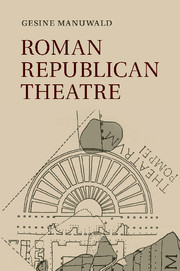Book contents
- Frontmatter
- Contents
- Preface
- Technical notes and abbreviations
- Introduction: previous scholarship and present approach
- PART I CULTURAL AND INSTITUTIONAL BACKGROUND
- PART II DRAMATIC POETRY
- 3 Dramatic genres
- 4 Dramatic poets
- 5 Dramatic themes and techniques
- Overview and conclusions: Republican drama
- Bibliography
- Index
4 - Dramatic poets
Published online by Cambridge University Press: 05 July 2011
- Frontmatter
- Contents
- Preface
- Technical notes and abbreviations
- Introduction: previous scholarship and present approach
- PART I CULTURAL AND INSTITUTIONAL BACKGROUND
- PART II DRAMATIC POETRY
- 3 Dramatic genres
- 4 Dramatic poets
- 5 Dramatic themes and techniques
- Overview and conclusions: Republican drama
- Bibliography
- Index
Summary
Assessments of dramatic poets in later ancient writers, highlighting particular qualities, show that specific characteristics of their output could already be observed in antiquity and that each playwright might be seen as having a distinctive poetic profile. For instance, Cicero says in one of his treatises that the tragic poets Ennius, Pacuvius and Accius differ from each other, each excelling in his different way of writing (Cic. De or. 3.27; cf. also Cic. Orat. 36). In another context Cicero judges a detail in Accius ‘better’ than in Ennius (Cic. Tusc. 1.105), calls Ennius ‘a wonderful poet’ (Cic. Tusc. 3.45: o poetam egregium!) and describes Pacuvius as ‘the supreme tragic poet’ (Cic. Opt. gen. 2: summum…poetam…Pacuvium tragicum). Notwithstanding an element of subjectivity, such comments indicate that both Cicero and his audiences assumed differences between representatives of one dramatic genre. A similar situation holds true for the comic side: according to the prologue to Plautus' Casina, audiences in the second century bce preferred ‘old’ comedies, Plautine ones in particular, because they did not like the ‘modern’ ones (Plaut. Cas. 5–20); Volcacius Sedigitus drew up an evaluative list of palliata poets (cf. Gell. NA 15.24); and Plautus' characteristic style became a criterion for decisions on the genuineness of the numerous plays ascribed to him (cf. Cic. Fam. 9.16.4; Gell. NA 3.3).
- Type
- Chapter
- Information
- Roman Republican Theatre , pp. 187 - 281Publisher: Cambridge University PressPrint publication year: 2011



